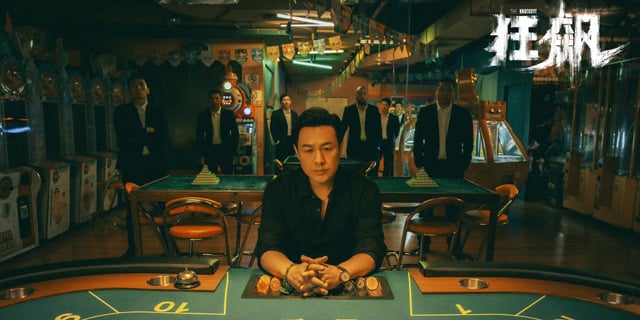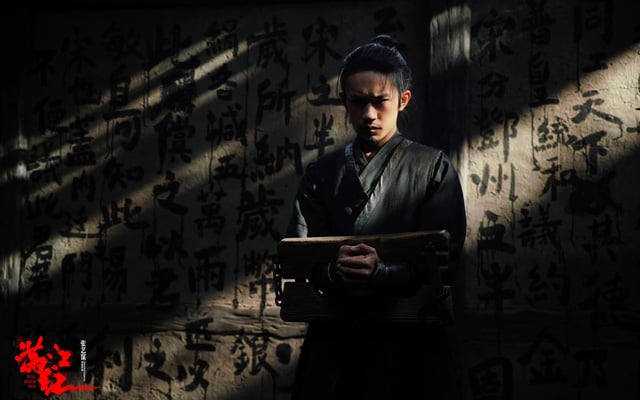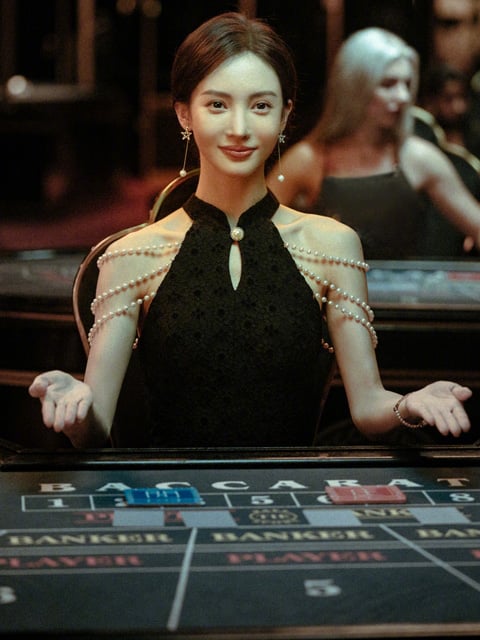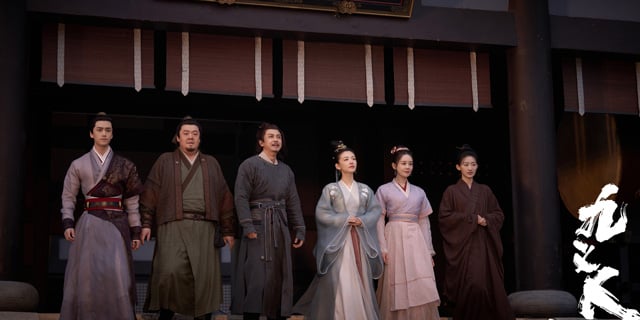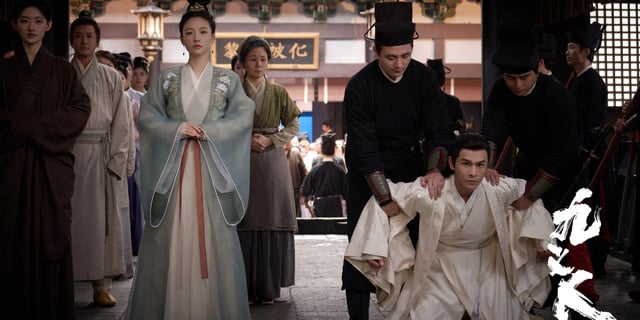In this year's Chinese film and television works, a part of them have satisfied the emotional value of the audience. For example, "The Knockout" and "Meet Yourself", as well as "No More Bets" and "Full River Red". The quantification of emotional value is difficult, but works that can be crowned with this concept are either popular or favored by certain groups, at least winning the resonance of some people. Which works belong to this category this year, and why have they conveyed emotional value?
"The Knockout": Confrontation of Emotions and Class Crossing
Although it was broadcast in the first quarter, the influence of "The Knockout" unsurprisingly lasted until the end of the year. The success is essentially a triumph of emotional representation. The thrill and satisfaction of crossing classes bring indescribable pleasure to the audience. In the popular comments from the audience, there are many descriptions such as "growing stronger and becoming a big shot" and "step by step towards success". Justice triumphs over evil, and the root causes of evil provoke deep thoughts.
The protagonist Gao Qiqiang (played by Zhang Songwen) and An Xin (played by Zhang Yi) complete a dual revenge. Initially, Gao Qiqiang, a fishmonger, was bullied by the market administrator, but he used the power of the latter to turn the tables. After that, he becomes unstoppable and starts wielding his knife against those in power. First it was Xu Jiang (played by Jia Bing), then Cheng Cheng (played by Qu Shanzhan) and Uncle Tai (played by Ni Dahong).
An Xin's intention is not revenge, but to punish the wicked and promote the good. However, in the decades of confrontation with Gao Qiqiang, he inadvertently becomes a avenger. It can't be said that this revenge is driven by selfish motives, but the sacrifices of comrades, the separation from loved ones, and the departure from a normal life have compelled him to construct a confrontational emotion involuntarily.
"The Knockout" satisfies the audience's pursuit of the dream of not in vain in this life. In Gao Qiqiang, most people project a kind of "mirror emotion": his actions are all wrong, but he accomplishes what I cannot do. People always project their emotions into the perspective of the strong, concealing their own lowliness and insignificance.
"Meet Yourself ": Spiritual Consolation of an Utopia
Among this year's cdramas, "Meet Yourself " is quite special. The concept of "slow pace" had not been mentioned for a long time before the broadcast of this drama. The slow variety shows of the previous years gradually lost their popularity, and the return-to-hometown dramas, which had become a trend in Japan and South Korea, were slow to localize in China. But it single-handedly ignited the blue ocean.
The story of "Meet Yourself " takes place in Dali, Yunnan. Dali is a popular tourist city with complete facilities. City dwellers like pastoral idyll and the embrace of mountains, with cows and sheep scattered around; but they don't like working in the fields and dealing with insects. Only in places like Dali, which are highly commercialized and urbanized countryside, can be captivating on the screen.
After three years of the pandemic, people's emotions have been highly suppressed. Going out for a walk and seeing the world has become the main aspiration of contemporary young people. Even if they can't go out temporarily, just watching others leisurely strolling around is enough to alleviate the pain of life.
Following Xu Hongdou (played by Liu Yifei), the audience took an immersive tour of Dali. With walls full of flowers, green horse pastures, Pu'er tea, delicious flower cakes, the sparkling Erhai Lake and the sunlit wheat fields, as well as the handsome and beautiful couple, everything is so beautiful, warm, and bright through the screen.
But life cannot be just an idyllic pastoral scene. "Meet Yourself " not only plays the role of a traveling frog, but also, with the help of Dali as a distant place, allows the audience to reexamine the dilemma of the essence of life and the gap between desires.
Is it better to live in a first-tier city with greater competition, better conditions, and more convenient daily life, or to return to a hometown with less pressure, a more comfortable environment, but less income? This old topic has been discussed in a new way.
"Full River Red": The Simple Value of Karma
"Full River Red" ranked first in this year's box office with a record-breaking 4.544 billion yuan. This is an extraordinary film. In recent years, no other film has received such widespread mockery online: director, lead actors, and the filming methods - and yet still become the box office champion of the year. Generally, mockery, ridicule, box office, and reputation are completely opposite concepts.
However, "Full River Red" manages to encompass them all. The box office success represents the simple emotions of the silent majority. Although the film as a whole adopts a comedic style, the underlying tone of tragic drama, wrapped within the genre of suspense, still provides a sense of emotional authenticity. It presents a simple moral value of karma: a group of good-hearted people who willingly sacrifice their lives to clear the hero's name.
The followers of Yue Fei regard their actions as a heart-revenge movement against Qin Hui. "Full River Red" smoothly connects the core of revenge with mainstream ideology through a portrayal of national resentment and personal hatred. Perhaps, in this era of seeking justice through public opinion, it is more fitting to make Qin Hui acknowledge the evil nature of his actions rather than resorting to the assassination of him. Based on this, the film itself dissolves the sinister attributes of torture, shame, and trauma, ultimately representing a mass-appealing, uplifting work of universal melody that can be easily embraced by the public.
"No More Bets": Modern Group Expedition of Collective Anger
Looking back, "No More Bets" can still be seen as a box office miracle. It earned over 500 million yuan in three days of preview screenings and a total box office of 3.84 billion yuan. The film does not boast a star-studded cast or a renowned director; the investment was a mere 80 million yuan, and some scenes are visibly simple. Yet, it managed to win the favor of audiences and even hindered the success of "Creation of the Gods I". Why? Because it is the best film this year in terms of emotional value in Chinese cinema.
Other films may capture the emotions of a specific group or community, but "No More Bets" takes the concept of national sentiment to the extreme, opening up a new emotional value track: collective anger. This is a more sophisticated existence than collective compassion or collective pride, shifting from war and national resentment to scammers and personal hatred. In modern society, there are not many themes that can transcend gender, class, and race to evoke anger among the entire population, but this film captures that essence.
Anger is a powerful force. It is, perhaps, the most powerful emotion. "No More Bets" seizes the thematic opportunity, but it is not just a victory in terms of the theme. It places the promotional context after the visual spectacle, allowing the spectacle to take the lead. It first portrays the audacity of the scammers and their habitual evil deeds, then depicts their ruthless and malicious means of deception, and further explores the unfortunate experiences of the victims, who are left devastated under the manipulation of the scammers. Finally, it lightly concludes: if one is not greedy, no one can deceive them.
Young people enter the cinema with the mindset of witnessing a spectacle, and after watching, they have the intention to remind their elders, bringing their parents to watch the film together. Based on this, "No More Bets" accomplishes a modern group expedition.
"Lost in the Stars": The Melancholy of the Era of Marriage and Love Fear
Among this year's Chinese films, "Lost in the Stars" is the most prominent in terms of its internet celebrity attribute. Before the film was released, short video platforms had already hyped it up.
"Lost in the Stars" is clearly a concept-driven creation. The term topic drama was popular a few years ago, referring to the practice of some creators capitalizing on hot topics to make dramas. This film can be considered a topic-driven film: wife murder, insurance fraud, love brain, intimate relationships, female solidarity. Pick any one of them, and it can generate billions of discussions. The film is packed with topics.
"Lost in the Stars" satisfies the fear of marriage and love among contemporary youth, especially young women. Perhaps everyone still believes in love, but lacks confidence in marriage. The chaos on the internet constantly speaks of the misfortunes within the walls of marriage. Not to mention the unscrupulous media that continuously stokes the flames of gender conflicts for the sake of traffic.
To strengthen this fear, "Lost in the Stars" uses intertextuality. The male protagonist murders his own wife to commit insurance fraud, while her best friend, in order to investigate the truth, travels a long way to a foreign land and sets up a trap for him. One endangers your life, the other restores your dignity. This depiction of "unreliable love, eternal friendship" coincides with the prevailing trend advocated in online public opinion.
"Faithful": Instant Pleasure of Female Solidarity
Undeniably, compared to the previous works, "Faithful" has seen a decrease in both scale and popularity. However, it has become a hit within its targeted audience, thanks to the triumph of emotional value. From the popular reviews on Douban, "Faithful" has some flaws: unattractive filters, flat acting, dragging for too long in the 25 episodes, lack of rhythm, and a somewhat rushed ending. But these flaws cannot overshadow its sharpness.
Indeed, the story of "Faithful" is simple, and can even be described as crude. Seeking revenge as a gentleman, a ten-year plan that is not too late, it does not break away from conventional thinking; the protagonist's hidden identity is a bit childish. However, in the face of emotional output, none of these matters. "Faithful" offers an instant pleasure.
Compared to traditional linear narratives, "Faithful" uses a dual-narrative structure to create intense tension around the concept of revenge for friends. The suffering endured seven years ago becomes all the more gratifying when avenged with equal measure after seven years. Instead of waiting for the grand finale to see the enemy's face, they are swiftly dealt with in the next episode, bringing immense satisfaction and joy.
This goes beyond the rebirth and revenge genre in female-oriented novels/dramas, and while not sophisticated, it is highly pleasurable. As a netizen put it, "the original work was a eulogy for Lin Yihan, but the drama goes further and becomes an anthem of feminism."
